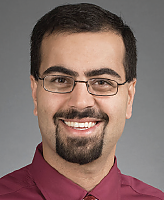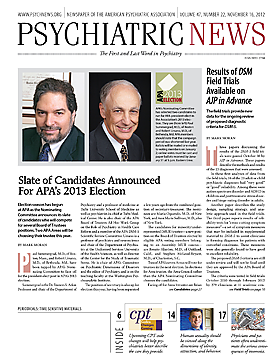When I ran for the Board of Trustees’ MIT position in 2010, I offered you three platform planks: improved communication, expanded mentoring/networking opportunities, and strong advocacy for both trainees and patients. Politicians and would-be leaders often make bold promises, but we’re rarely honest about how well we’ve delivered. So, I’m using this column to report back on where I’ve succeeded and where I haven’t and to tell you about one particularly exciting success. As you plan to elect your next MIT Trustee early next year, I hope it’s useful to you to think about the issues on which he or she should focus.
I feel I’ve done best on communication, which has been my top priority. I send out regular e-mails with updates on resident-related issues, we now have our own LinkedIn group, the Caucus of Members-in-Training is meeting quarterly by conference call and in person at APA annual meetings, and overall our MIT group is doing a lot more outreach.
There is still plenty of room for improvement—that communication is only about resident topics, not the bigger challenges facing the whole APA. We could still do much more with our Web site, particularly in terms of usability. However, I’ve also had a significant victory here. At its meeting in October, the Board approved a two-year pilot of my proposal for “town hall” gatherings. Now, every time a Board member attends a conference or otherwise travels to a professional meeting, he or she has funding to organize a meeting with members (including psychiatry residents) and directly learn from you about what APA should be doing. Pretty much every conference you’ll attend has at least one APA Trustee among the speakers— invite them to use those newly allocated funds to host a session for residents and connect with their younger colleagues. I’ll also be trying to host these gatherings as I travel for job interviews; we’re targeting the first to be in Boston.
In the advocacy area, I had hoped to speak for better housestaff working conditions, but then Congress threatened to eliminate GME funding entirely. Now, APA and every other medical organization is fighting to preserve your salary, and multiple Board of Trustees members are adding to this crucial effort.
APA is also doing what it can to promote psychiatry’s value, and you may see good reimbursement news related to changes in CPT codes that will benefit psychiatrists. Just as importantly, the Board understands how important payment reform is to psychiatrists and is actively working to position us in the “medical home” model, which will be a key component of the future health care system. I cannot claim any specific achievements here, because I took office to find a Board that already “gets it” in multiple domains involving physician payment issues. My role has been to encourage these forward-looking efforts and praise all of our APA leaders who have taken the time to understand and work on the issues.
On mentorship, however, I have not met my goals. During the election campaign, I had a vision of a nationwide program in which we used APA’s district branches and their Assembly representatives to guide MITs in launching their careers. We now have a Mentorship Committee in the Assembly, a Board work group on early-career opportunities, and continued funding for our special-interest fellowships. I’ve also discovered that APA does some amazing mentoring work at the annual meeting each spring, largely targeting researchers, minorities, and other “endangered” groups.
Those are important efforts, but they are solutions for those who can participate and who can attend the meeting. What we have not found yet is an answer for the general-purpose adult clinician or for psychiatrists who are unable to attend the annual meeting. That’s a problem, because it means that even if APA is doing well in advocating for your needs, it doesn’t have a good in-person connection to help residents understand the Association’s values. I assure you that I will keep searching for ideas for the rest of my term.
On balance, two out of three isn’t bad, and I think I’ll be leaving you next May better off than when I started. However, the lack of a good general mentoring program is a big piece of unfinished business I’m leaving for future Trustees. Even the successes, like the town-hall program and the greater communication through our MIT caucus, will need an advocate to maintain them. As you get asked for your vote this winter and decide who’ll fill this seat after your current MIT trustee-elect, Erik Vanderlip, I hope you’ll keep that to-do list in mind and vote to keep us moving forward!

Alik Widge, M.D., Ph.D., is APA’s member-in-training trustee and a PGY-4 resident at the University of Washington .

